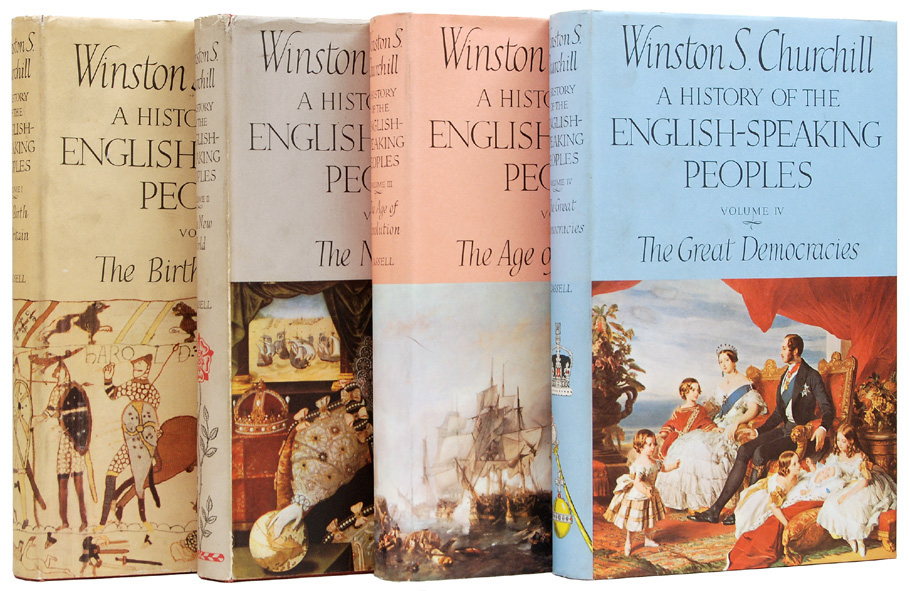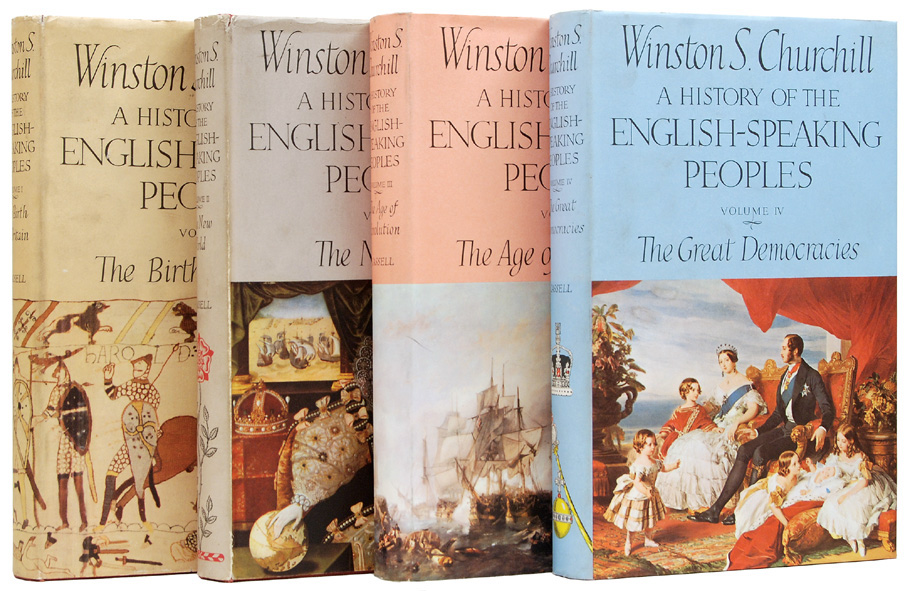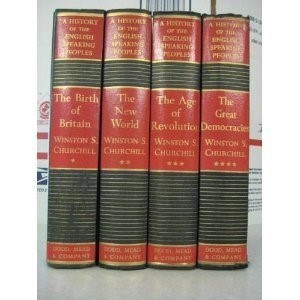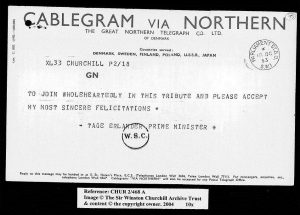
Finest Hour 173
Winston Churchill: The English-Speaking Peoples and the Free World

August 14, 2016
Finest Hour 173, Summer 2016
Page 32
By João Carlos Espada
João Carlos Espada is the director and founder of the Institute for Political Studies at the Catholic University of Portugal. This article is extracted from his new book The Anglo-American Tradition of Liberty: A View from Europe (Routledge, 2016).
 Winston Churchill was indeed the best representative of an old, well established and highly respectable political tradition: the Anglo-American political tradition of liberty under law. His political philosophy was not that of a maverick or an outsider, but that of a very old political tradition that goes back to Magna Carta, the Glorious Revolution, and the American Revolution.
Winston Churchill was indeed the best representative of an old, well established and highly respectable political tradition: the Anglo-American political tradition of liberty under law. His political philosophy was not that of a maverick or an outsider, but that of a very old political tradition that goes back to Magna Carta, the Glorious Revolution, and the American Revolution.

2024 International Churchill Conference
This tradition, of limited government and of liberty under the law, has often been associated with a specific English political tradition, the conservative one. Whether or not Churchill considered the principle of limited government as a specific conservative principle is a matter open to dispute. Churchill certainly expressed in a very telling manner his opposition to revolutionary plans to redesign a social order. But it seems to me that he associated this opposition to unlimited political power with a broad consensus between the two main British parliamentary families in the nineteenth century, the Conservatives and the Liberals.
This is particularly striking when he recalled the political philosophy of Sir Francis Mowatt, a top civil servant who had been private secretary to Gladstone and had served both under him and Disraeli, the two rival leading statesmen of Victorian England, one Liberal and the other Conservative. Sir Francis’s political philosophy, as described by Churchill, could hardly be more opposed to revolutionary and absolutist political projects:
He represented the complete triumphant Victorian view of economics and finance; strict parsimony; exact accounting, free imports whatever the rest of the world might do; suave, steady government; no wars; no flag-waving, just paying off debt and reducing taxation and keeping out of scrapes, and for the rest—for trade, industry, agriculture, social life—laissez-faire and laissez-aller. Let the Government reduce itself and its demands upon the public to a minimum; let the nation live of its own; let social and industrial organisation take whatever course it pleased, subject to the law of the land and the Ten Commandments. Let the money fructify in the pockets of the people.1
Churchill did not attribute to a single party or a single political family this sort of consensus on limited and small government. In fact, it seems fair to say that Churchill attributed this consensual view to the British people and, more broadly, to the English-speaking peoples. He saw in that consensual disposition an expression of a special attachment to liberty among the English-speaking peoples. This only can explain his persistent commitment to writing A History of the English-Speaking Peoples, which he started in 1932 but only managed to publish more than twenty years later, in 1956.
Writing to one of his literary assistants about the book in April 1939, Churchill said:
In the main, the theme is emerging of the growth of freedom and law, of the rights of the individual, of the subordination of the State to the fundamental and moral conceptions of an ever-comprehending community….Of these ideas the English-speaking peoples were the authors, then the trustees, and must now become the armed champions. Thus I condemn tyranny in whatever guise and from whatever quarter it presents itself. All of this of course has a current application.2
When the book finally came out, in 1956, Churchill wrote in the preface to the first of four volumes:
For the second time in the present century the British Empire and the United States have stood together facing the perils of war on the largest scale known among men, and since the cannons ceased to fire and the bombs to burst we have become more conscious of our common duty to the human race. Language, law, and the process by which we have come into being, already afforded a unique foundation for drawing together and portraying a concerted task. I thought when I began that such a unity might well notably influence the destiny of the world. Certainly I do not feel the need for this has diminished in any way in the twenty years that have passed.3
What were the political underpinnings of this “common duty to the human race”? Churchill presented them several times and at different occasions. One of the most striking still remains his broadcast to the United States on 8 August 1939:
It is curious how the English-speaking peoples have always had this horror of one-man power. They are quite ready to follow a leader for a time, as long as he is serviceable to them; but the idea of handing themselves over, lock, stock, and barrel, body and soul, to one man, and worshiping him as if he were an idol—that has always been odious to the whole theme and nature of our civilisation…. Checks and counter-checks in the body politic, large devolution of State government, instruments and processes of free debate, frequent recurrence to first principles, the right of opposition to the most powerful governments, and above all ceaseless vigilance, have preserved, and will preserve, the broad characteristics of British and American institutions.4
This “horror of one-man power,” Churchill thought, went far back in the history of the English-speaking peoples. He thought it had had a significant expression, even though probably only half-understood at the time, in the Magna Carta of 1215:
No one at the time regarded the Charter as a final settlement of all outstanding issues, and its importance lay not in the details but in the broad affirmation of the principle that there is a law to which the Crown itself is subject. Rex non debet esse sub homine, sed sub Deo et lege—the king should not be below man, but below God and the law.5
Churchill then argued that, out of this concern with limited government which was at the heart of Magna Carta, a new concept emerged, that of accountability to Parliament:
If the Crown is to be kept within its due limits some broader basis of resistance must be found than the ancient privileges of the nobility. About this time, in the middle of the thirteenth century we begin to have a new word, Parliament….In two or three generations a prudent statesman would no more think of governing England without a Parliament than without a king.6
And then, as he approaches the conclusion of his preface to the first volume of A History of the English-Speaking Peoples, he states that
Unlike the remainder of Western Europe, which still retains the imprint and tradition of Roman law and the Roman system of government, the English-speaking peoples had at the close of the period covered by this volume achieved a body of legal and what might be called democratic principles, which survived the upheavals and onslaughts of the French and Spanish Empires. Parliament, trial by jury, local government by local citizens, and even the beginnings of a free Press, may be discerned, at any rate in primitive form, by the time Christopher Columbus set sail for the American continent.7
Enjoyment of Decentralised Ways of Life
Churchill certainly perceived the British and the Anglo-American tradition of liberty as part of the broader Western civilisation. But he certainly also believed in the specificity of the political culture of the English-speaking peoples within the West. One of the crucial elements of this specificity, I submit, is the understanding of liberty and democracy as the result of a long, gradual evolutionary process. On the European continent, by contrast, democracy tends to be perceived mainly as a rather modern innovation that was brought about through a rupture with the past. This has created huge misunderstandings. A crucial one has been the acceptance of revolutions as normal, perhaps indispensable, instruments of change and of progress.
Nothing could be farther from Churchill’s political philosophy. He expressed his allergy to revolutions on innumerable occasions. One of the most inspiring was certainly his description of his father’s political views:
He [Lord Randolph Churchill] saw no reason why the old glories of Church and State, of King and country, should not be reconciled with modern democracy; or why the masses of working people should not become the chief defenders of those ancient institutions by which their liberties and progress had been achieved. It is this union of past and present, of tradition and progress, this golden chain, never yet broken, because no undue strain is placed upon it, that has constituted the peculiar merit and sovereign quality of English national life.8
It is this commitment to the golden chain of gradual evolution that has allowed the British to perceive representative government limited by law mainly as a protection of their own decentralised ways of life. These ways of life exist as homes of real people, who have inherited them from their ancestors and will pass them on to their descendants. In this spontaneous dialogue between generations, these ways of life will gradually be adapted and made more convenient under new circumstances. But in no way can they or should they be redesigned by the arbitrary will, or an abstract scheme of perfection, of a single power. People, as individuals or persons, are there first, prior to governments, the main purpose of the latter being to protect the right to life, liberty, and the pursuit of happiness, as the American Declaration of Independence of 1776 famously put it.
Curiously enough, it was along these lines that two great poets of the twentieth century defined the British cause in the Second World War. In 1943, John Betjeman said the following on the BBC:
I do not believe we are fighting for the privilege of living in a highly developed community of ants. That is what the Nazis want….For me, at any rate, England stands for the Church of England, eccentric incumbents, oil-lit churches, Women’s Institutes, modest village inns, arguments about cow parsley on the altar, the noise of mowing machines on Saturday afternoons, local newspapers, local auctions, the poetry of Tennyson, Crabbe, Hardy and Matthew Arnold, local talent, local concerts, a visit to the cinema, branch line trains, light railways, leaning on gates and looking across fields; for you it may stand for something else…something to do with Wolverhampton or dear old Swindon or wherever you happen to live.9
In 1948 T. S. Eliot described English culture precisely as a “way of life” that includes “all the characteristic activities and interests of a people”:
Derby Day, Henley Regatta, Cowes, the twelfth of August, a cup final, the dog races, the pin table, the dart board, Wensleydale cheese, boiled cabbage cut into sections, beetroot in vinegar, nineteenth-century Gothic churches and the music of Elgar.10
In this sense, Churchill was an interpreter of and heir to what he himself and many others have called “the English spirit.” This spirit is sceptical of dogmatic abstractions and of geometric plans to re-design decentralised institutions and traditions. As Churchill himself put it, it is a spirit of compromise and gradual evolution:
In England the political opinion of men and parties grows like a tree shading its trunk with its branches, shaped or twisted by the winds, rooted according to its strains, stunted by drought or maimed by storm….In our affairs as in those of Nature there are always frayed edges, border-lands, compromises, anomalies. Few lines are drawn that are not smudged.11
The shortest and most inspiring description of this “English spirit” that I have come across was given by the eccentric Oxford historian A. L. Rowse. In a book precisely entitled The English Spirit, Rowse argued that the distinguished feature of this English spirit is the absence of “angst” or ennui:
At the core of the English spirit is happiness, a deep source of inner contentment with life, which explains the Englishman’s profoundest wish, to be left alone, and his willingness to leave others to their own devices so long as they do not trouble his repose.12
As Bagehot and Oakeshott put it, this is a disposition to enjoy, an inner sentiment of happiness, of celebration of life and of the privilege to be able to enjoy a way of life that is of one’s own, that is familiar to one’s own, that was not imposed from without. It is a disposition of scepticism towards political adventures, intellectual fashions, schemes of perfection, and towards every sort of specialist who claims to know best how to organize our education, our culture and our spiritual life. In a word, it is a politics of imperfection, which intentionally does not aim at schemes of perfection, and which springs from a disposition to enjoy liberty—and to defend it at all costs.
This disposition to enjoy liberty, I submit, was at the heart of Churchill’s political temperament. The impact of this disposition on his political philosophy was best described by Martin Gilbert:
Here then were the three interwoven strands of Churchill’s political philosophy: “the appeasement of class bitterness” at home, “the appeasement of the fearful hatreds and antagonisms abroad,” and the defence of Parliamentary democracy and democratic values in Britain, in Western Europe, and in the territories under British rule or control. Wherever possible, the method to be used was conciliation, the route to be chosen was the middle way, the path of moderation. But where force alone could preserve the libertarian values, force would have to be used. It could only be a last resort—the horrors of war, and the very nature of democracy, ensured that—but in the last resort it might be necessary to defend those values by force of arms.13
Endnotes
1. Winston S. Churchill, Thoughts and Adventures (London: Thornton Butterworth, 1934), p. 54.
2. Churchill to Maurice Ashley, 12 April 1939, CHAR 8/626, Churchill Archives Centre, Cambridge.
3. Winston S. Churchill, The Birth of Britain (London: Cassell, 1956), p. vii.
4. Martin Gilbert, Churchill’s Political Philosophy (Oxford: Oxford University Press, 1981), p. 100.
5. Churchill, Birth of Britain, p. xvi.
6. Ibid., p. xvii.
7. Ibid., p. xix.
8. Churchill, Thoughts and Adventures, p. 52.
9. Peter Mandler, The English National Character: The History of an Idea from Edmund Burke to Tony Blair (New Haven, CT: Yale University Press, 2006), p. 207.
10. Ibid.
11. Churchill, Thoughts and Adventures, p. 53.
12. A. L. Rowse, The English Spirit: Essays in History and Literature (London: Macmillan, 1945), p. 36.
13. Gilbert, p. 82.
Subscribe
WANT MORE?
Get the Churchill Bulletin delivered to your inbox once a month.




